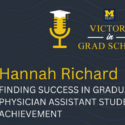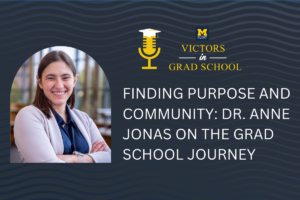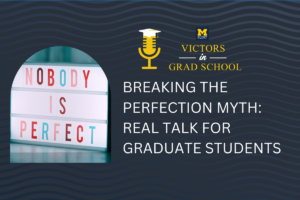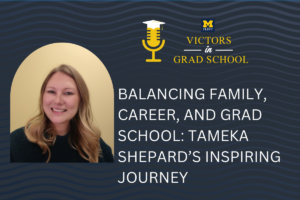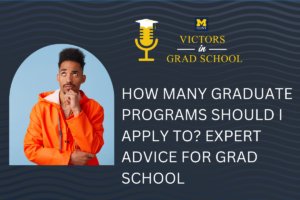Embarking on the path to becoming a physician assistant is a significant journey filled with challenges, growth, and invaluable experiences. In a recent podcast episode of Victors in Grad School, host Dr. Christopher Lewis had a compelling conversation with graduating physician assistant student Hannah Richard. The dialogue delved deep into Hannah’s personal journey, from her decision to pursue a career as a PA to navigating the rigorous demands of PA school. Let’s explore key insights and reflections shared by Hannah as she transitions from student life to professional practice.
Discovering the Path to PA School:
Hannah’s journey to PA school began with a spark of curiosity and intrigue during her high school anatomy class. Like many aspiring PA students, she was drawn to the profession’s blend of medical knowledge and patient care. The process of deciding to pursue graduate education in physician assistant studies involved navigating challenges, doubts, and ultimately reaffirming her commitment to this rewarding career path.
Preparing for PA School:
As Hannah shared, the preparation for PA school goes beyond academic readiness. It requires gaining hands-on experience, accruing clinical hours, and honing essential skills to thrive in the demanding environment of a PA program. From working as a certified nurse assistant to learning procedures and patient assessment, each experience contributed to Hannah’s preparedness for the rigorous journey ahead.
Navigating the Challenges of PA School:
PA school is a transformative experience that demands flexibility, resilience, and self-awareness. Hannah highlighted the importance of listening to oneself, understanding when to push forward and when to prioritize self-care. The transition from didactic learning to clinical rotations brings unique challenges, requiring students to adapt their study methods, collaborate with peers, and maintain a balance between academic rigor and personal well-being.
Reflections on Professional Preparedness:
As graduation approaches, Hannah reflects on how her PA school experience has equipped her for the next chapter in her professional journey. The diverse backgrounds and experiences of her classmates have enriched her learning, preparing her to navigate the complexities of patient care with confidence and competence. From mastering procedures to building practical skills, PA school has laid a solid foundation for Hannah’s transition into the healthcare workforce.
Advice for Aspiring PA Students:
Drawing from her own experiences, Hannah offers invaluable advice to future PA students embarking on their graduate school journey. She emphasizes the importance of embracing all aspects of life during PA school, from academic pursuits to extracurricular involvement and mental health support. By actively engaging with resources, seeking mentorship opportunities, and maintaining a holistic approach to education, students can maximize their success and personal growth throughout their PA school experience.
Hannah Richard’s journey from student to graduating physician assistant is a testament to the dedication, passion, and resilience required to thrive in the field of healthcare. Her insights offer a glimpse into the multifaceted nature of PA education, emphasizing the significance of self-awareness, adaptability, and community engagement in fostering success. As aspiring PA students navigate their own paths, Hannah’s story serves as an inspiring reminder of the transformative power of perseverance, learning, and embracing the full spectrum of experiences on the road to becoming a healthcare professional.
TRANSCRIPT
Dr. Christopher Lewis [00:00:01]:
Welcome to the victors in grad school, where we have conversations with students, alumni, and experts about what it takes to find success in graduate school.
Dr. Christopher Lewis [00:00:11]:
Welcome back to Victor’s in Grad School. I’m your host, doctor Christopher Lewis, director of graduate programs at the University of Michigan, Flint. Really excited to have you back again this week. This week, as always, I love being on this journey with you. This opportunity to talk to you every week about what you’re doing to find success in this journey that you’re on. Now you might be just starting to think about grad school. You might be in grad school. You might be looking at that light at the end of the tunnel and you’re almost done.
Dr. Christopher Lewis [00:00:43]:
Wherever you are in this journey, it is a journey. And every person that goes through what you’re going through, goes through a unique journey for themselves. What’s important is that you have some tools in your toolbox as you apply, as you go through graduate school that you can draw upon to be able to find success on that journey. And that’s what this show is all about. This show is all about finding ways to be able to help you to find success earlier in that process, to be able to help you to learn more about what you need to be doing as you, as I said, apply, go through and go beyond. So every week, I love being able to bring you different people. People that have gone through grad school, that are going through grad school, and have had different experiences. But those experiences have led them to find success in that journey that they went on.
Dr. Christopher Lewis [00:01:43]:
And today, we have another great guest with us. Hannah Richard is with us today. And Hannah is a graduating physician assistant student from the University of Michigan Flint. She’s actually graduating this term and heading off into her professional career. We just talked and talked about her future, and she has a job ready to go, going to be working on the west side of Michigan as a PA in an emergency room, just what just what she wanted to do. So she I know she’s really excited about that. She’s got a lot of things happening in her life. But throughout that experience, she’s been able to find success, and I’m excited for her to share that journey with you.
Dr. Christopher Lewis [00:02:25]:
Hannah, thanks so much for being here today.
Hannah Richard [00:02:26]:
I’m excited to be here as well.
Dr. Christopher Lewis [00:02:28]:
Well, I’m really excited that you are here today. And I guess let’s turn the clock back in time. I would love for you to talk to me about the journey that you went on to be able to, at some point, through that undergraduate experience, you made a decision that you wanted to go further, you wanted to go beyond the bachelor’s degree to be able to get that master’s degree, and especially masters in physician assistant studies. So talk to me about what went through your head that made you decide that graduate school was
Hannah Richard [00:03:04]:
right for you? Yeah. So I think similar to a lot of other master students or for that matter, PA students, we kind of all had a similar epiphany. Maybe in like high school or college. We came into contact with PA’s or became aware of the profession. My journey is similar to that. I took an anatomy class in high school and I was really shocked with how much I was intrigued by it. And prior to that, I didn’t really have any idea of what I wanted to do in college. And I had time, you know, I was a junior in high school.
Hannah Richard [00:03:34]:
And then I started college, and I made my major right away, a general health science degree. And then the university that I went to, Grand Valley, they had a pre PA emphasis, meaning that you could take prerequisite courses and still earn a degree. So I did that, and I’m not gonna lie. There was definitely a time where I changed my degree from that to a different degree just because I’d heard of the daunting process of PA school and how difficult it is to get in. But somewhere along the line, I came back around to PA. I changed my major back, and I just kept putting one foot in front of the other, and I took the prerequisites as needed. Took classes in the summer to kind of graduate faster, and then I knew I needed some health care hours. So I started working during the summer as well, and it was a little bit more difficult for me to work during the school year.
Hannah Richard [00:04:31]:
I actually was a college athlete, so I couldn’t have a job and swim and go to school. So that kinda slowed things down, but it all worked out for the better. So I took 2 years off before PA school, and during that time I was applying, and the application cycle is very long. It can take probably up to a year. I I’d say that’s how long it took me. But from by the time you apply and then you hear back, and then if you interview, and then if you’re accepted. So it was a long journey for me, but I’m glad that I’m almost to the end.
Dr. Christopher Lewis [00:05:03]:
So you took those 2 years off to figure things out and to make that next step for yourself. And in that journey, you applied, I’m sure, to a number of different graduate schools. You ended up choosing to attend the University of Michigan Flint. Talk to me about that decision making process, and what made you choose that U of M Flint was the right program for you?
Hannah Richard [00:05:26]:
Yeah. So I tell everyone this who asks because actually at one point, during my career here, I was a graduate ambassador, so I kind of told the story a lot. But I went to a open house at U of M Flint for the PA program. This was right before the pandemic started, so I think it was probably February of 2020, and professor Gilkey, who is our director, actually was hosting the event, and I just heard all the wonderful things that they were setting up for this program and the promises of great rotations and excellent education and community service, and I was hooked. I was like, this is where I’d like to go. The campus is really nice, and it’s somewhere that I’ve never really been before, so I said this is where I wanted to go. So like you mentioned, obviously, I applied to other places to cast a wide net, but ultimately, I wanted to end up here.
Dr. Christopher Lewis [00:06:21]:
In those 2 years that you took to prepare yourself for applying, I’m sure that you were getting some experience in preparing in that way too, because I know PA programs do require you to have different experiences to prepare you for coming into becoming a physician assistant. Talk to me about the experiences that you had that prepared you for coming into PA school, and and how did that prepare you, or did you feel unprepared in any way when you entered the program?
Hannah Richard [00:06:51]:
Great question. I did some research because I knew I needed to find a way to get hours, and I found out the best way for me personally was going to become a certified nurse assistant, which is stands for CNA. And, I took the class. It was a summer class. I think it was like 2 or 3 weeks. And I got a job in a nursing home, around my college campus. And I did that for as long as I could, and I had to stop because I was then entering my senior year of college. After my senior year of college, I stayed on the west side for a little bit longer and I got another job in a different nursing home, one that was hiring.
Hannah Richard [00:07:31]:
And I worked there for a while. And then I came kind of towards the end of the road where I felt like I needed more experience. I was also kind of ready to not work on the weekends, and it’s definitely a hard job, and I was ready for something different. So I had some connections which was fantastic which was fantastic. And because I was able to use some of the experiences I had from being a CNA and then learn so many new skills. I learned how to give injections, how to obviously take vitals. I did some charting. I was trained as kind of a part time scribe as well, so I was really grateful for the physicians and PAs and MPs that worked there.
Hannah Richard [00:08:20]:
They were willing to train me because they knew that I ultimately wanted to be a PA, and so they kinda pushed me out of my comfort zone. So I will say if I did not have that medical assistant experience, I probably would have struggled a little bit in PA school because, ultimately, we are providers, and we are responsible for charting and just assessing the patient overall, and I think I got a good taste of that when I was working in a
Dr. Christopher Lewis [00:08:53]:
physician assistant student, and it is a demanding program. It’s a dem it’s a demanding sequence of events, didactic learning, clinical learning, taking what you’re learning from the class, putting it into action. Talk to me about some of those moments, some of the things that you didn’t expect when you entered into PA school that you had to learn for yourself that would have helped you maybe to know earlier?
Hannah Richard [00:09:17]:
That is definitely a deep question. I think the first thing that comes to mind is flexibility. I think that when students who were to some degree successful in their undergraduate career because you have to achieve good prerequisite grades and also have a part time job or a full time job getting the hours. I think a lot of us can be kind of set in our ways as far as studying or preparing for certain assessments. And I think the biggest thing PACE will taught me is to be flexible, that some ways of studying won’t be the same as they were in college. So I kind of drew on many ways of studying. I would write things out. I would look at charts.
Hannah Richard [00:09:58]:
I would read books. I listened to podcasts, which is something I never did before. There’s a lot of great PA podcasts, so I think flexibility is one of the biggest things as far as what I had to kind of learn to adapt to. And then I think another thing about PA school that’s really interesting is reaching out and being with people in your class. I think in undergraduate studies, I studied a lot alone. And when I was found myself in PA school, I studied with a group of friends frequently, and I think it helped all of our grades and helped all of our comprehension when you’re talking and singing out loud. And then, of course, when it comes to patient evaluation course that we have, we have to actually perform the exams on fake patients. And so that was a perfect opportunity to bring in your friends to for that.
Hannah Richard [00:10:49]:
So I think flexibility and then just kind of accepting that other people around you has something to share just like you do as well.
Dr. Christopher Lewis [00:10:57]:
So you took a couple of years off between your undergraduate work at Grand Valley and then came into grad school. And every student, when they make that transition into graduate school, it is a transition. And you do have to think about things differently, learn differently. You kind of mentioned some of those pieces. Talk to me about what you had to do to truly find success in that transition and what you had to do to maintain that success throughout your time in the PA program.
Hannah Richard [00:11:28]:
That’s a good question. I think one of the biggest things for me was learning to listen to myself. And when I say that, I mean, listening to how I felt. And this changed from didactic year, which is the 1st year of our pro 1st year and a half actually, to clinical year, which is another year. So in didactic, the studying is completely different. But I learned to listen to myself and see how I felt. If I if it was the end of the day and it was after dinner, I was tired. I didn’t push myself too hard.
Hannah Richard [00:12:03]:
I would, you know, try to commit to maybe, say, 30 minutes of reading out of a textbook versus an hour and a half of studying. And this was especially true in clinical year, which is the year that I’m just completing. And the reason is is because we are driving all over to our rotation sites, and we deal with patients and providers and preceptors, and we still have to go home at the end of the day and study. So I think I really, really tuned into myself how I was feeling. Because if you’re too tired and your brain is just zapped, you’re not gonna be able to retain information. And I no one told me that before I came into PA school. I think everyone things I had heard would then were just like study, study, study, like, pull all nighters and, you know, do all the stuff that can make you successful. Well, I think that’s absolutely absolutely not the case.
Hannah Richard [00:12:56]:
I think you have to give yourself grace because we are we’re human. And I think that’s true for when you practice as a PA.
Hannah Richard [00:12:56]:
You can’t go, go, go, go and go, go, go, go and not listen to yourself because at the end of the day, the people that will be harmed by that are the patients and then ultimately yourself.
Dr. Christopher Lewis [00:13:17]:
And now you’re getting to the end of your program. And as I said, you have this opportunity now to go out and to start in your career. Talk to me about the learning that you went through, through that didactic learning, through the clinical experiences. How do you feel that that has prepared you for the next step in your own professional journey?
Hannah Richard [00:13:40]:
I think it’s prepared me really well. I think one of the cool things about preschool is that everyone comes in with different backgrounds, kind of like you mentioned. So while someone may have worked in a nursing home, someone may have worked in a doctor’s office, someone may have been a scribe in a hospital. And I think that’s really cool and not a lot of professions kind of get that pre master’s degree or pre doctorate degree education and learning experience. So I think having different classmates with different specialties prior to b school is is huge. You know, someone may be able to help you on this topic, and others may be able to help you on this exam or procedures. Something that I think gets overlooked to the general public who may not know a lot about PA school is while we’re learning this information, we’re also learning procedures. So we have days where we learn lumbar punctures and chest tubes and arterial lines and IVs.
Hannah Richard [00:14:36]:
And because that is a part of our training. And even if you go into say a cardiology office and you may not use those procedures, you still have to learn them and become competent in them. So kind of to, like, round up your question is, I think it prepared me and my classmates really well, and I think it’s something that is just really neat about PA schools that we all have different experiences.
Dr. Christopher Lewis [00:15:01]:
Now earlier, you mentioned that in your time at the University of Michigan Flint, you also acted as an ambassador, and you talked to prospective students. And I guess as you’re talking to students specifically about becoming a physician assistant or about applying to becoming a physician assistant down the road. What were some of the biggest concerns, and how did you help those students to deal with those concerns as a ambassador for the program?
Hannah Richard [00:15:33]:
Some of the biggest concerns clearly were the application process, and this had very little to do with U M Flint and very much to do with just the standardized process of applying to PA school. So I had a lot of questions, and these students would reach out to me via email, phone call, in person events. Our program hosted showcase night. I don’t know how to describe it other than that, but, oh, kind of like an open house. So I would get a lot of questions on, does this prerequisite match this prerequisite? However, that’s more difficult to answer because, every undergraduate degree and prerequisite may fit U of M Flint versus a different university. So that was a huge one. I think a lot of hurdles that people were experiencing were finding clinical hours and shadowing hours. I know that COVID kinda changed the landscape of medicine in some good ways and some not so good ways.
Hannah Richard [00:16:32]:
So for instance, I know a lot of students struggled to find shadowing hours because the pandemic repercussions lasted for a few years or even ongoing currently. So, not a lot of offices or hospitals wanted kind of an extra student following them around potentially exposing or being exposed to COVID. So and that is something that PA programs almost all absolutely require is shadowing hours because they want to know why you want to be a PA versus a nurse practitioner or an or physician. So that was another big hurdle. And then I think other questions that we got were regarding to our experience in the program. 1 of our professors say that picking a PA program is kind of like dating, So you have to like the program, and they have to like you, which I think is a funny analogy, but it’s actually absolutely true. So they wanted to know kind of what our day to day life was like, the subjects we learned, did we have a cadaver lab? Is there on campus coffee stores? And so I was more than happy to answer the dry or mundane questions as far as applications, and then I was equally as happy to tell them about my life. And did I move from Metro Detroit and or did I commute? And I was just happy to kind of share my experience here because I would have absolutely loved to talk to someone like that at any of the programs I applied to.
Dr. Christopher Lewis [00:17:56]:
Now one of the things you just mentioned was the fact that sometimes students are trying to determine and they are asked the question of, okay, why PA? Why not MD? Why not getting a nurse practitioner degree? You made the choice that you wanted to become a physician assistant. And through your undergraduate program, you probably could have been and could have gone the route of MD. What made you decide that PA was right for you?
Hannah Richard [00:18:23]:
You know, I used to have this answer down pat and memorized for applications and interviews. And now that almost 3 years have passed, I don’t have a standardized answer, which is a good thing. I wanted to be a PA for a few reasons. And one of them was I was looking for a right fit for the kind of life I wanted. I wanted to be out and practicing earlier in my life rather than later. And I think physicians have great lives and great careers. However, their training is obviously longer. So not only do they have 4 years of med school after undergraduate, they have residency, which can be anywhere from 2 years to 4 years to 8 years, depending on the specialty.
Hannah Richard [00:19:08]:
So they wanted to be able to practice earlier. Another thing was is that I had a great experience with the PA. In college, I spent a lot of time in the athletic training room. Swimming can be hard on the body, but I was seeing a PA and I was just so intrigued. She was so knowledgeable and she spent so much time with me, and I had really never experienced anything like it. You know, your family doctor is more often than not, especially back when I was growing up in high school and college, a physician. So to have experience with this PA, I was just like taken aback. And especially when I started shadowing the PAs, I shadowed a PA who worked in orthopedic surgery and she was first assisting the surgeon in knee replacement and the hip replacement and a partial knee.
Hannah Richard [00:19:53]:
And I was just shocked that you can be a PA. You can have some aspects of what it’s like to be a physician. You can have some aspects of what it’s like to be a more, just like a different role. And it just fit really well for me in my life. And I at some point, you have to pick a career and you can’t say this or that. You have to just start making progress towards it. And that is for all those reasons I chose to be a PA because ultimately I wanted to practice and treat patients and just provide good care.
Dr. Christopher Lewis [00:20:28]:
Now as you think about people that are coming behind you, whether they’re going into becoming a physician assistant or some other career area, but they’re thinking about graduate school in general. What’s one piece of advice you’d wanna give to every student that is looking for ways to find success sooner in their graduate school experience?
Hannah Richard [00:20:48]:
That is a tough question to pinpoint it down to something that would help them to success sooner. I would have to say, continue living your life. And when I say that, I mean, when you’re in graduate school, it’s very easy to put the blinders on and be a graduate student. Go to class, go to lectures, go to clinicals. But another thing our professor says life does not stop just because you’re in PA school. So my advice would be, go to that rec volleyball game, go to the gym with your classmates, attend volunteering events and get involved with things like becoming a graduate ambassador or anything mentoring upcoming students. I think the more you put in, the more you’ll get out, and it’s very easy to just put your head down, get your degree, and, you know, walk away a successful, successfully licensed PA. But the more that you put in, like I said, the more you’ll get out.
Hannah Richard [00:21:49]:
So I think use the resources. If you need mental health counseling, take advantage of that at U of M. If you need someone to talk to, if you wanna join a club, if you wanna do anything, I say take advantage of it because once that 28 months are over, your life is And so I knew that I wanted to look back and say, say I did everything I was interested in. And that also included student society. I was a representative for our student association of the state of Michigan. So just do it all. That is my advice to find success earlier.
Dr. Christopher Lewis [00:22:22]:
Well, Hannah, I just wanna say thank you. Thank you for sharing your journey today, for walking us through this path that you’ve been on, and I am looking forward to hearing more about your own professional journey as you move forward in your career, and I wish you all the best.
Hannah Richard [00:22:39]:
Yes. Thank you. I appreciate it so much. And I appreciate you taking the time to chat with me and listen to my story. I always say that an attitude of gratitude is best, and I am very grateful for everything that U of M Flint has provided me. And I try to give them back everything that they have given me, including the opportunity to be a physician assistant. So thank you.
Dr. Christopher Lewis [00:27:30]:
The University of Michigan Flint has a full array of masters and doctorate programs if you are interested in continuing your education. Whether you’re looking for in person or online learning options, the University of Michigan Flint has programs that will meet your needs. For more information on any of our graduate programs, visit umflint.edu/graduateprograms to find out more. Thanks again for spending time with me as you prepare to be a victor in grad school. I look forward to speaking with you again soon as we embark together on your graduate school journey. If you have any questions or want to reach out, email me at flintgradoffice@umflint.edu.

